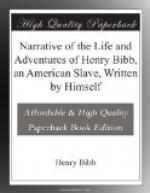After I found that he took me to be a slave trader I knew that it would be of no use for me to tell him that I was myself a slave looking for a master, for he would have doubtless brought up the same objection that others had brought up,—that I was too white; and that they were afraid that I could read and write; and would never serve as a slave, but run away. My reply to the question respecting the quality of my slaves was, that I did not think his lumber would suit me—that I must have the cash for my negroes, and turned on my heel and left him!
I returned to the prison and informed my wife of the fact that I had been taken to be a slaveholder. She thought that in addition to my light complexion my being dressed up in Garrison’s old slave trading clothes might have caused the man to think that I was a slave trader, and she was afraid that we should yet be separated if I should not succeed in finding some body to buy us.
Every day to us was a day of trouble, and every night brought new and fearful apprehensions that the golden link which binds together husband and wife might be broken by the heartless tyrant before the light of another day.
Deep has been the anguish of my soul when looking over my little family during the silent hours of the night, knowing the great danger of our being sold off at auction the next day and parted forever. That this might not come to pass, many have been the tears and prayers which I have offered up to the God of Israel that we might be preserved.
While waiting here to be disposed of, I heard of one Francis Whitfield, a cotton planter, who wanted to buy slaves. He was represented to be a very pious soul, being a deacon of a Baptist church. As the regulations, as well as public opinion generally, were against slaves meeting for religious worship, I thought it would give me a better opportunity to attend to my religious duties should I fall into the hands of this deacon.
So I called on him and tried to show to the best advantage, for the purpose of inducing him to buy me and my family. When I approached him, I felt much pleased at his external appearance—I addressed him in the following words as well as I can remember:
“Sir, I understand you are desirous of purchasing slaves?”
With a very pleasant smile, he replied, “Yes, I do want to buy some, are you for sale?”
“Yes sir, with my wife and one child.”
Garrison had given me a note to show wherever I went, that I was for sale, speaking of my wife and child, giving us a very good character of course—and I handed him the note.
After reading it over he remarked, “I have a few questions to ask you, and if you will tell me the truth like a good boy, perhaps I may buy you with your family. In the first place, my boy, you are a little too near white. I want you to tell me now whether you can read or write?”
My reply was in the negative.




